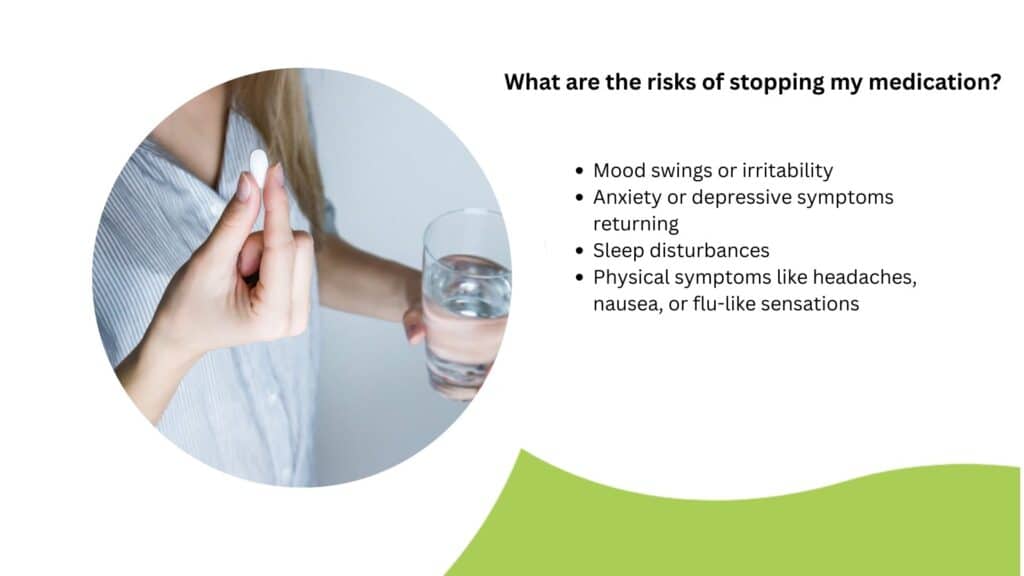
Antidepressants and anti-anxiety medications play an important role in treating mental health conditions like depression, panic disorder, and generalized anxiety disorder. These medications can help regulate mood, reduce anxiety, and improve daily functioning. While they’re often effective, some individuals may eventually consider stopping them—whether because of side effects, feeling stable, or wanting to explore alternative treatments.
If you’re thinking about stopping your medication, it’s important to understand the right way to do it and what to expect during the process. Below are answers to some of the most frequently asked questions.
Is it safe to stop taking my medication?
Stopping antidepressants or anti-anxiety medication abruptly is not considered safe. Doing so can lead to withdrawal symptoms known as antidepressant discontinuation syndrome (ADS). These symptoms can include dizziness, nausea, fatigue, irritability, insomnia, and even a return of anxiety or depressive symptoms. Always consult your healthcare provider before making any changes to your medication.
How should I taper off my medication?
The safest way to stop taking these medications is through a gradual taper. This involves slowly reducing the dose over time under the supervision of your doctor. The tapering plan will depend on the type of medication, how long you’ve been on it, your current dosage, and how your body responds. In most cases, tapering can take several weeks or even months. This slower approach helps reduce withdrawal symptoms and supports a smoother transition.
What are the risks of stopping my medication?
Stopping your medication without a plan or guidance can lead to uncomfortable symptoms and increased risk of relapse. Some common risks include:
- Mood swings or irritability
- Anxiety or depressive symptoms returning
- Sleep disturbances
- Physical symptoms like headaches, nausea, or flu-like sensationssto
A structured tapering plan minimizes these risks and allows your provider to monitor your progress and make adjustments if necessary.
Can I switch to a different medication instead of stopping?
Yes, switching to another medication might be a better option than stopping altogether. This may be appropriate if you’re not experiencing improvement or if you’re having side effects with your current medication. Your doctor can help you safely transition to a new medication, which might involve overlapping the two for a short period or tapering one while starting the other.
What should I do if I experience withdrawal symptoms?
If you notice symptoms during or after tapering, let your healthcare provider know right away. They might recommend adjusting the tapering schedule or returning to a previous dose before trying again more gradually. Some withdrawal symptoms resolve quickly, while others may take longer to fade, so ongoing support is essential.
How long does it take to stop taking antidepressants safely?
This varies from person to person. A tapering process can take anywhere from a few weeks to several months, depending on:
- The type of medication
- The length of time you’ve taken it
- Your current dosage
- Your history with depression or anxiety
It’s important to be patient and work closely with your provider throughout the process.
Are there natural alternatives to help with anxiety or depression after stopping medication?
Many people turn to non-medication strategies to maintain their mental health after tapering off antidepressants. These options may include:
- Cognitive Behavioral Therapy (CBT)
- Exercise and physical activity
- Meditation or mindfulness practices
- Dietary changes and improved sleep hygiene
- Support groups or individual counseling
While these approaches can be helpful, they are not substitutes for medication in all cases. It’s important to have a treatment plan tailored to your needs.

Will I feel like myself again without medication?
Some people feel more like themselves once they’ve stopped medication, while others may find that their symptoms return or shift in unexpected ways. Emotional ups and downs can occur, especially in the early stages of tapering. With proper medical support, therapy, and lifestyle adjustments, many individuals are able to thrive without medication—but everyone’s experience is different.
What questions should I ask my doctor before stopping?
To make an informed decision, consider asking your provider:
- Do you think I’m ready to taper off this medication?
- What tapering schedule do you recommend?
- What symptoms should I watch for?
- How can I reach you if I need support during the process?
- What are the next steps if I begin feeling worse?
The key to stopping depression or anxiety medication safely is preparation, support, and professional guidance. If you’re thinking about making a change, don’t go it alone—talk to your doctor and develop a plan that’s right for you.
Schedule Your Complimentary TMS Screening Today
At My TMS Therapy, we’re here to help you restore your energy and joy. Our compassionate team will guide you through every step of the process.
Call us at (877) 548-8081 or contact us online to book your screening today.
Sources:
Mayo Clinic. “Antidepressant withdrawal: Is there such a thing?” https://www.mayoclinic.org/diseases-conditions/depression/in-depth/antidepressants/art-20046273
National Institute of Mental Health (NIMH). “Mental Health Medications.” https://www.nimh.nih.gov/health/topics/mental-health-medications
Harvard Health Publishing. “Coming off antidepressants: Making the decision.” https://www.health.harvard.edu/diseases-and-conditions/antidepressants-not-just-for-mood-disorders
Cleveland Clinic. “Antidepressant Discontinuation Syndrome.” https://my.clevelandclinic.org/health/diseases/25218-antidepressant-discontinuation-syndrome


